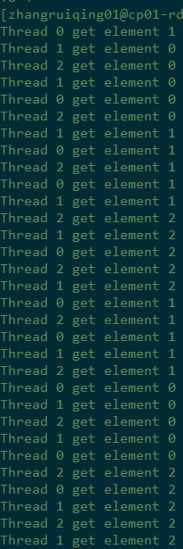python多线程threading
发布时间:2019-09-21 11:05:06编辑:auto阅读(2189)
本文通过 4个example 介绍python中多线程package —— threading的常用用法, 包括调用多线程, 同步队列类Queue, Ctrl+c结束多线程。
example1.
调用10个线程, 分别打印0~4, 每打印一个数pause一秒钟。
code如下所示, 在test()函数中用threading.Thread建立10个线程;
一种方法是不要将这些线程设置为守护线程,如code所示;
一种方法是设置守护线程( setDeamon(True)),并用join()让程序等所有线程结束了再退出(即去掉code中的注释);
#/*********************************************************************
# *-
# * Copyright (c) 2015 Baidu.com, Inc. All Rights Reserved
# *-
# *********************************************************************
#-
#-
#-
#/**
# * @file b.py
# * @author zhangruiqing01(com@baidu.com)
# * @date 2015/10/28 20:12:33
# * @brief-
# *--
# **/
#
import time
import threading
def printf(i):
for x in xrange(5):
time.sleep(1)
print i,
def test():
thread_list = []
for i in xrange(10):
sthread = threading.Thread(target = printf, args = str(i))
# sthread.setDaemon(True)
sthread.start()
thread_list.append(sthread)
# for i in xrange(10):
# thread_list[i].join()
if __name__ == '__main__':
test()结果:
$python b.py
0 1 2 3 4 5 6 7 8 9 2 1 0 4 5 6 7 3 8 9 1 2 0 5 6 7 4 3 8 9 2 1 0 6 7 4 3 5 8 9 1 0 2 7 4 635 8 9
example2.
调用10个守护线程(每个守护线程的timeout时间为1s), 分别打印0~4, 每打印一个数pause x秒钟, x为0~4之间的randint值。
#/***************************************************************************
# *-
# * Copyright (c) 2015 Baidu.com, Inc. All Rights Reserved
# *-
# **************************************************************************/
#-
#-
#-
#/**
# * @file c.py
# * @author zhangruiqing01(com@baidu.com)
# * @date 2015/10/28 20:15:33
# * @brief-
# *--
# **/
#
import time
import threading
import random
def printf(i):
randtime = random.randint(1,5)
for x in xrange(5):
time.sleep(randtime)
print "T" + str(i), randtime # print T<threadid> randtime
def test():
thread_list = []
for i in xrange(10):
sthread = threading.Thread(target = printf, args = str(i))
sthread.setDaemon(True)
sthread.start()
thread_list.append(sthread)
for i in xrange(10):
thread_list[i].join(1)
if __name__ == '__main__':
test()结果:

从图中可见,在运行的这10s中, pause x秒的thread被打印了[10/x]次。
example3.
引入Queue, 带同步功能(enqueue和dequeue不用手动加锁)的queue类。
在下面的code中,proc函数处理一个thread的操作:
1. dequeue 一个队头元素
2. enqueue 5个threadid
3. 重复执行两次步骤2(epoch<2)
这里注意proc函数中的最后Q.task_done()表示一个任务(一个dequeue的元素)已经结束;test( )中最后的Q.join()为等待队列为空才退出程序。
#/***************************************************************************
# *-
# * Copyright (c) 2015 Baidu.com, Inc. All Rights Reserved
# *-
# **************************************************************************/
#-
#-
#-
#/**
# * @file d.py
# * @author zhangruiqing01(com@baidu.com)
# * @date 2015/10/28 20:22:33
# * @brief-
# *--
# **/
#
import time
import threading
import random
import Queue
Q = Queue.Queue()
def proc(threadid, epoch):
while True:
time.sleep(1)
try:
ele = Q.get()
print 'Thread ' + str(threadid) + ' get element ' + str(ele)
except Queue.Empty:
print 'Thread ' + str(threadid) + ' get empty queue'
continue
if int(epoch) < 2:
for i in xrange(5):
Q.put(threadid)
epoch = int(epoch) + 1
Q.task_done()
def test():
Q.put(1)
thread_list = []
for i in xrange(3):
args = [str(i), str(0)]
sthread = threading.Thread(target = proc, args = args)
sthread.setDaemon(True)
sthread.start()
thread_list.append(sthread)
Q.join()
if __name__ == '__main__':
test()
结果:
PS:最开始get到的1是在test()中put进去的;

example4.
程序接收ctrl + c后退出。程序每个thread打印100次threadid,直到ctrl+c退出。
PS: 更好的设计是在try,except后加finally块, 做到即便不ctrl+c也可以正常退出,就留给大家下面练习吧~
#/***************************************************************************
# *-
# * Copyright (c) 2015 Baidu.com, Inc. All Rights Reserved
# *-
# **************************************************************************/
#-
#-
#-
#/**
# * @file a.py
# * @author zhangruiqing01(com@baidu.com)
# * @date 2015/10/28 20:06:33
# * @brief-
# *--
# **/
#
import time
import threading
def printf(i):
for x in xrange(100):
time.sleep(1)
print i,
def test():
for i in xrange(10):
sthread = threading.Thread(target = printf, args = str(i))
sthread.setDaemon(True)
sthread.start()
try:
while 1:
time.sleep(1)
except KeyboardInterrupt:
print 'exit'
if __name__ == '__main__':
test()运行结果:

上一篇: 用Python来合并图片(SoEasy)
下一篇: Python 多进程开发与多线程开发
- openvpn linux客户端使用
52056
- H3C基本命令大全
51925
- openvpn windows客户端使用
42150
- H3C IRF原理及 配置
38995
- Python exit()函数
33495
- openvpn mac客户端使用
30447
- python全系列官方中文文档
29083
- python 获取网卡实时流量
24113
- 1.常用turtle功能函数
24019
- python 获取Linux和Windows硬件信息
22370
- LangChain1.0-Agent-部署/上线(开发人员必备)
122°
- LangChain1.0-Agent-Spider实战(爬虫函数替代API接口)
154°
- LangChain1.0-Agent(进阶)本地模型+Playwright实现网页自动化操作
167°
- LangChain1.0-Agent记忆管理
149°
- LangChain1.0-Agent接入自定义工具与React循环
176°
- LangChain1.0-Agent开发流程
162°
- LangChain1.0调用vllm本地部署qwen模型
183°
- LangChain-1.0入门实践-搭建流式响应的多轮问答机器人
189°
- LangChain-1.0入门实战-1
189°
- LangChain-1.0教程-(介绍,模型接入)
204°
- 姓名:Run
- 职业:谜
- 邮箱:383697894@qq.com
- 定位:上海 · 松江
